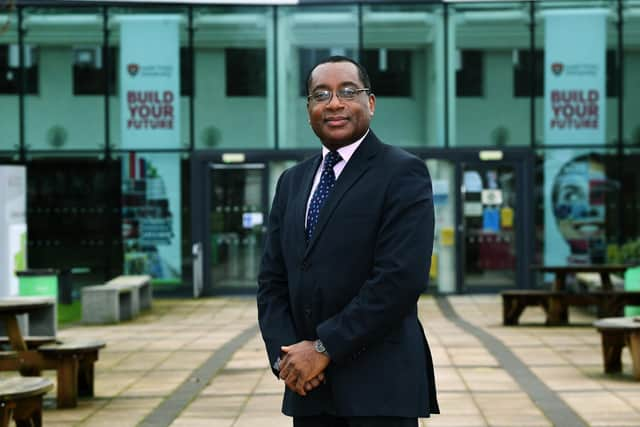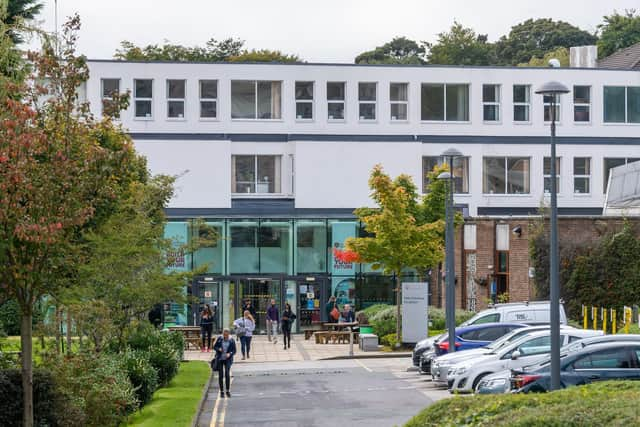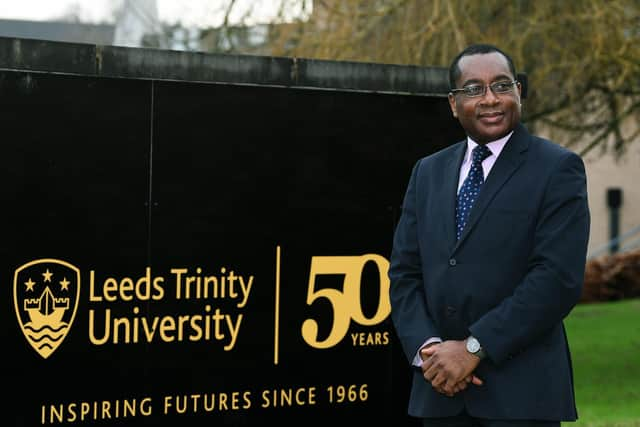Leeds Trinity University Vice-Chancellor Professor Charles Egbu on how higher education can be more diverse
While he was born in Abatete, in Nigeria, Professor Charles Egbu’s heart is firmly planted in Leeds after he was embraced by the city following the death of his father.
Now, as the Vice-Chancellor at Leeds Trinity University, he has come full circle in the place he calls home and is on a mission to ensure universities increase opportunities for black, asian and minority ethnic (BAME) students in higher education.
Advertisement
Hide AdAdvertisement
Hide AdProfessor Egbu, 56, who has more than 25 years of experience in the sector, said a combination of coming from a hard-working family and being fortunate to have a close family friend who saw his potential has enabled him to flourish in leadership.
“My father and my mother instilled in me the importance of education, the importance of showing me you can get to wherever you want if you are hard working,” he explained.
His father Lawrence passed away when he was 18 and he came to join his mother Margaret, who was training as a nurse, in Leeds on 11 August 1984.
He said: “There is something special about Leeds - its ability to welcome people, the genuineness in the city, the recognition that diversity has something to give the community and the society. And particularly to have the opportunity to live out your potential.”
Advertisement
Hide AdAdvertisement
Hide AdHe went on to graduate from Leeds Polytechnic (now Leeds Beckett University) with a first class honours in quantity surveying, and later a doctorate in construction management from University College London.


Prof Egbu said: “For much of my studies I have always been the only black student in the class.”
He added: “I have had some challenges... Have I experienced racism, yes I have... Have I experienced insidious racism, of course.
“I’ve gone through a journey of 35 years in education...My inner self belief has been important.”
Advertisement
Hide AdAdvertisement
Hide AdBefore taking over the roles as Leeds Trinity University vice-chancellor from predecessor Margaret House OBE in November last year, he held numerous leadership roles including being Pro Vice-Chancellor for education and experience at the University of East London and dean of the school of built environment and architecture at London South Bank University.


Speaking about what attracted him to the West Yorkshire institute, he said: “Leeds has always been at the heart of everything I do and that is why I was so delighted to come back to this great city after many many years.”
Prof Egbu, who reads a lot of motivational books, stressed it was vital to have taken on the pioneering role to act as a role model and ensure universities in the UK have a more representative mix of staff at a senior level.
He said: “Being one of the very very few black vice-chancellors I think it opens up opportunity, at least the possibility for the many academics who want to pursue their career who are BAME.
Advertisement
Hide AdAdvertisement
Hide Ad“It affords the opportunity of students who want to come into academia to think, ‘you know what if Charles can do it they can do it’. I hope In that respect I can be a role model and offer some hope and confidence.”


The number of black academics working in the most senior positions in UK universities has fallen to just a handful at most, according to Higher Education Statistics Agency (HESA).
Due to the way the statistics are rounded, it is understood this means between zero and two people from black backgrounds were recorded as working as academic “managers, directors and senior officials” in 2018/19.
Overall in 2018/19, there were 540 academics working in the top managerial jobs, and of these 475 were white.
Advertisement
Hide AdAdvertisement
Hide AdA total of 15 were recorded as coming from an Asian background, five from a mixed background, and a further five from another background. The ethnicity of the rest was not known.
Recent data also showed that only 0.7 per cent of professors at UK universities are black. While only six per cent of all UK students were from a black African background but this group represented only three per cent of postgraduate research students, according to 2019/20 figures.
“These numbers are very very small,” said Professor Egbu. “In regards to BAME academics it’s fair to say we need to do more.”


He added a number of measures should be taken by UK universities to create more opportunities for BAME students in higher education.
Advertisement
Hide AdAdvertisement
Hide AdThis includes an “open culture policy” and making sure the curriculum’s design and content is inclusive and representative to the BAME community.
“We need to create a sense of belonging so that students will be retained,” he said.
The total percentage of black academic staff in Yorkshire stands at 1.4 per cent, according to recent analysis by Yorkshire Universities, a group representing 12 institutions in the region. This is below the national average of 1.9 per cent.
While black students in Yorkshire made up just three per cent of the region’s total student population of 196,000, according to figures from the academic year 2018-19.
Advertisement
Hide AdAdvertisement
Hide AdProf Egbu said: "Universities across Yorkshire have an important role to play.
"We need to make changes collectively - one institution cannot do it alone. We need to team up to share good practices, understand the issues, vocalise the issues and be bold and courageous.”
Leeds Trinity University is bucking the trend in the region after it became the first university in the region to achieve the racial equality charter last year, after introducing a number of initiatives over the past five years.
This includes investment in PhD studentships for BAME students and reforming its recruitment processes - resulting in the proportion of BAME staff rising from 4.7 per cent to 6.2 per cent in the past year.
Advertisement
Hide AdAdvertisement
Hide AdWhile currently a total of 20.6 per cent of the professors identify as BAME and 3.4 per cent of our professors identify as black or black British.
The film Re:Tension, produced by Leeds Trinity academic Ricardo Barker, has also been shared with other universities in the UK to discuss institutional racism, unconscious bias and the impact this can have on retention and attainment for BAME students in higher education.
He added a lack of ambition for black undergraduate students in all stages of their journey is stifling ambitions and aspirations in higher education.
Prof Egbu said: “Diversity and equality is absolutely at the heart of what we do.”
Advertisement
Hide AdAdvertisement
Hide AdHe added a lack of ambition for black undergraduate students in all stages of their journey is stifling ambitions and aspirations in higher education.
He said: “I know the BAME students at times yearn to see more people like themselves in higher education.
“I have a vision… where the attainment gap for BAME students is zero.
“In other words those who come out - whether they are BAME students or white students there should be no difference.
Advertisement
Hide AdAdvertisement
Hide Ad“The vice-chancellor or the leader really has an important role. It sets the direction of travel for others to follow.”
______________
Support The Yorkshire Post and become a subscriber today.
Your subscription will help us to continue to bring quality news to the people of Yorkshire. In return, you'll see fewer ads on site, get free access to our app and receive exclusive members-only offers. Click here to subscribe.
Comment Guidelines
National World encourages reader discussion on our stories. User feedback, insights and back-and-forth exchanges add a rich layer of context to reporting. Please review our Community Guidelines before commenting.